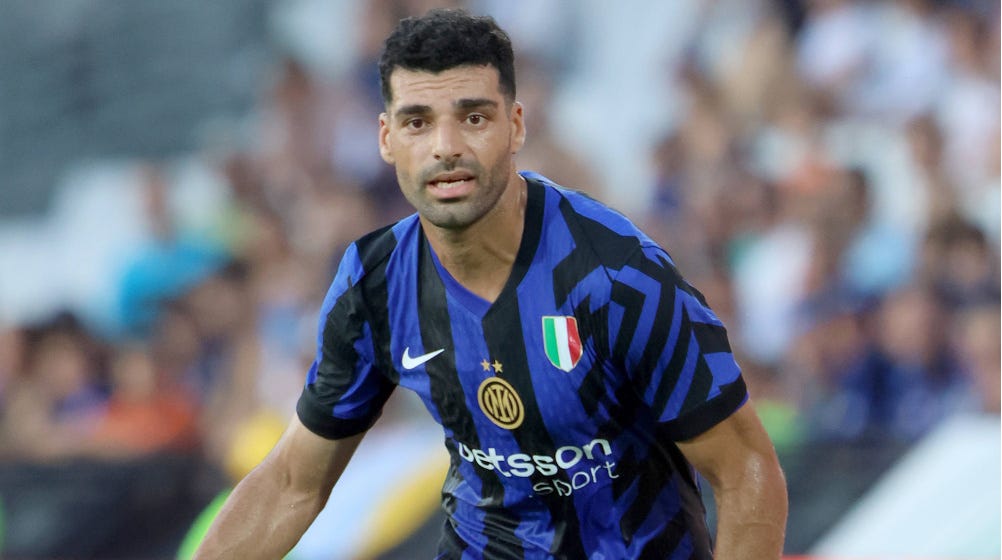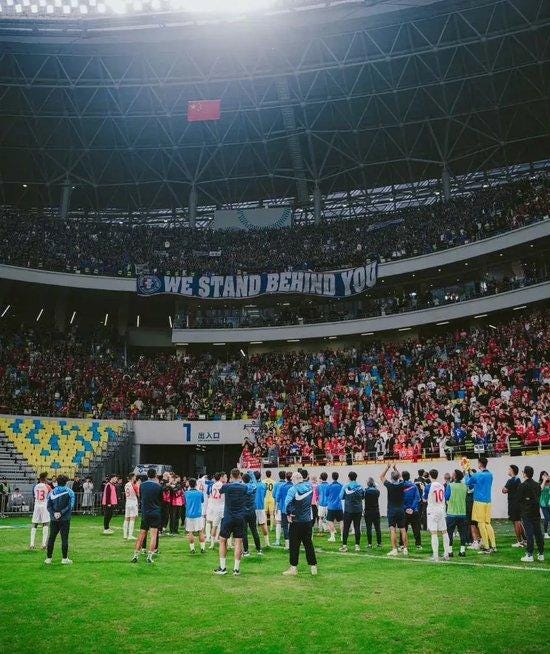Son Heung-min is a legend of Asian football. His exploits on the football field have been well-reported across the continent. They have also been well-recognised. The captain of South Korea and Tottenham Hotspur has been named as the Asian Football Confederation’s International Player of the Year on four of the last seven occasions. From 2014 to 2023, he also won the Best Footballer in Asia award, one given by Titan Sports in China, nine times.
And Mehdi Taremi? He’s had nothing. There was a second place this year at the AFC awards which followed third last year.
As the awards were announced last week in Seoul, Taremi reportedly contacted the Iranian media to say:
“In international forums, they don't give points to Iranians, and this is a lack of recognition. We ourselves know that we are one of the best and we do our best for our country.”
The Inter Milan striker is certainly one of the best. Taremi has repeatedly hit the target over the years in domestic and international football and his latest comments are similarly accurate. There is little doubt that in Asian and international terms, Iranian football does not get the recognition and praise it deserves.
The national team have qualified for six World Cups, in Asia only Japan and South Korea have managed more, and are looking very likely to make that seven. The country produces top talent. The U-17 team reached the quarter finals of the 2017 World Cup and the Round of 16 last year. They won the Asian title in 2008 and usually reach the latter stages. Young prospects go on to play in the big leagues.
When I first started covering Asian football back in the late nineties, Ali Daei was the king. The moustachioed marksman played for Bayern Munich. Mehdi Mahdavikia played in the Bundesliga, for Hamburg and Eintracht Frankfurt, for a decade. Ali Karimi also appeared for Bayern. Those three won the AFC award in 1999, 2003 and 2004 respectively. Karimi was the last one.
There has been plenty of talent since. There was Sardar Azmoun, a sharp striker who shone in Russia before moving to Roma and Bayer Leverkusen and then Dubai, to spend more time with his horses. And, of course, there is Taremi. Emerging as a hard-working striker, there were doubts that he had what it takes to go right to the top. They were soon dispelled. His goals helped Porto to the 2022 title and he was the Primera Liga’s top scorer twice and made team of the season four times. Had he gone to Europe as a teenager, as Son did, instead of a 27 year-old, then the achievements would surely have been even more impressive.
Yet he has not been honoured in Asia while Son barely has room in his London home for all his continental awards.
If he played in the English Premier League it would help. Son has been a star –and a global face –of the most popular league in the world. His exploits are watched around Asia in a way that even major clubs like Inter and Porto can’t compete with. Taremi has been linked with Arsenal and Manchester United but it never happened.
More generally though, there are other factors that help explain why Iran does not get the coverage it should. For much of the international media, it is harder to cover football in Iran than in most other countries. If you are not connected to an organisation such as the AFC or a team/club that is going to play in the country, then it can be relatively difficult to just get into the ancient nation. Over the years, Iranian teams have progressively become less open when they go overseas too.
Politics plays a part. The lack of football interaction leads to a lack of football interest and also means that whenever the spotlight is shone on the country, it falls elsewhere.
This is often understandable when it comes to women being barred from entering stadiums, the ruling regime’s influence on the game and also when the national team is caught up in protests at home. Still, it is easy to empathise with the Iranian players and coaching staff who became annoyed at being constantly asked about the political situation back home by journalists such as in the 2022 World Cup when there were few football questions.
“Why don’t you ask the other coaches?” Iran coach Carlos Queiroz said in Qatar. “Why don’t you ask Southgate: ‘what do you think about England and the United States that left Afghanistan and all the women alone?’”
Back home, the Iranian league is not as successful or prominent as it once was. Relatively speaking, the Iranian league has fallen behind some regional rivals in recent years. A lack of money in the local game, political interference, incompetence and mismanagement have all contributed. At the turn of the century, Tehran giants Persepolis and Esteghlal were known far and wide, but now fans outside Asia know Saudi clubs such as Al-Hilal, Al-Nassr and Al-Ittihad. There is almost zero coverage of the Iranian league outside the country.
Tale of One City
You have to feel sorry for Shanghai Shenhua. The Blues were last champions of China in 1995 and then finished second eight times in the next 13 years. The title win in 2003 was chalked off a decade later due to match-fixing and the club, despite a loyal army of fans, had drifted ever since.
Not this season. Under former Russia and Hull City boss Leonid Slutsky, Shenhua fought it out at the top of the Chinese Super League table with defending champions Shanghai Port.
With the rest nowhere, it seemed as if August’s Shanghai derby would be pivotal and when Shenhua won 3-1 to go top above their rivals, it seemed as if the title was finally coming home. It was followed by four wins by a single goal –the form of champions surely –and then there were only two games left. It all went wrong against relegation-battling Shenzhen Peng City (part of the City Football Group) in the penultimate match as it ended 2-2.
That was all Shanghai Port, coached by Kevin Muscat, needed. Going into the final game of the season, a win against Tianjin Jinmen Tigers would do and it ended in a 5-0 victory.
Amid the celebrations in the red corner of China’s biggest city, Port forward and the league’s top scorer Wu Lei had some kind words for the runners-up, saying that with their young players Shenhua will definitely end their drought before long.
That was the message from over 1,000 fans who went to the airport to welcome the team back from their game in Chengdu. Shenhua may be hurting but have something to build on for the future.





